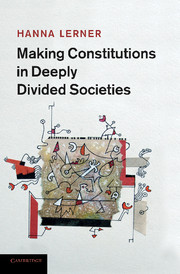Conclusion
Published online by Cambridge University Press: 25 October 2011
Summary
In this book I have endeavored to present an approach to constitution-making where there is severe disagreement over the shared norms and ultimate goals of the state. The book demonstrates how, by deferring controversial choices regarding the foundational aspects of the polity, an incrementalist constitutional approach enables deeply divided societies to either enact a written constitution or function with a material constitution.
At the moment of foundation, drafting a formal constitution is typically seen as a high-stakes moment in which the polity's commitments and definitions are entrenched for future generations. In the context of societal polarization between competing visions of the state, this moment is one fraught with risk. The constitutional architects in the three deeply divided societies studied here recognized this danger, and tried to circumvent it by transferring the task of making definitive choices regarding the normative and symbolic basis of the state to future political institutions. Instead of conceiving the moment of constitution-making in revolutionary terms, they introduced elements of incrementalism into the process. The constitutional arrangements they constructed included clear institutional and procedural arrangements. But when it came to contested foundational issues that touched upon the definition of “the people,” the framers preferred to postpone unequivocal choices. By implementing constitutional strategies such as avoidance, legal ambiguity and symbolic ambivalence, the drafters exported contentious decisions from the formally entrenched constitutional arena to the realm of ordinary politics.
Since unequivocal choices were evaded but not ignored, the adopted constitutional arrangements encompass the competing perspectives of the state.
- Type
- Chapter
- Information
- Making Constitutions in Deeply Divided Societies , pp. 230 - 234Publisher: Cambridge University PressPrint publication year: 2011



